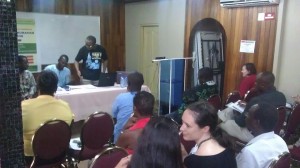A New Wave of Reason in Africa
At least 55 persons attended the international freethought conference recently held in November in Accra. This meeting hosted by the newly formed local humanist group was the first of its kind in the history of Ghana – a country recently polled to be the world’s most religious nation. The conference generated both local and international media attention, with reports carried by Reuters and the BBC. Humanist and skeptical activists from other west African countries – including Liberia, Nigeria, and Sierra Leone – attended the program. Many foreigners living in Ghana were also at the event. To many local participants, the event was a great opportunity to meet physically with people of like mind. It was a great boost to the growing community of reason-oriented persons in a country where they often feel lonely or isolated.
There were presentations from resource persons drawn from Ghana and overseas. These presentations focused on the challenges facing skeptically oriented individuals and non religious people in the region particularly in the face of threats from fanatics and paranormalists.
One of the guest speakers, Prof Raymond Osei, emphasized the need for an ‘African Humanism’ that is free from any imposition of western humanist canons. Personally I found this objectionable. Humanist and skeptical values are universal, not western, and so are the dangers posed by dogma, unreason and superstition. How these universal values are applied to specific challenges in specific regions can be qualified as African, European, Asian or Australian, but that should not be taken to mean that African humanist or skeptical values are distinct and different from such values as obtain in other parts of the world or vice versa. In a world that has become a global village such categorizations are no longer tenable. Instead these ‘false’ dichotomies could only undermine our ability to put issues into perspective. They can only hamper the pace of progress and development.
I delivered a keynote at the event and used my presentation to remind participants of the wise words of Ghana’s first president Kwame Nkrumah and the implications of his thoughts for humanism and skepticism in the region. Several years ago, Nkrumah said: “Fear created the gods, and fear preserves them, fear in bygone ages of wars, pestilence, earthquakes and nature gone berserk, fear of acts of God. Fear today of the equally blind forces of backwardness and rapacious capital.” As I noted in my speech, this “saying was true of Africa of Nkrumah days and is true of Africa of today. Millions of Africans are suffering and dying due to fear and ignorance.”
Many more Africans are suffering and dying due to ‘the fear of those acting in the name of god – the priests, pastors, prophets, imams, sangomas, faith healers, witch doctors who confuse, manipulate and exploit gullible ignorant folks. The witch hunters, the jihadists and ‘crusaders’, in Mali, Nigeria, Uganda, Sudan, Egypt, Kenya, Somalia, Algeria and in other places who kill and maim – or incite people to kill, maim and abuse – in the name of their god or the supernatural.’
The conference started with a music video, the Symphony of Science, featuring lyrics from prominent philosophers, skeptics and scientists – Bertrand Russell, Carl Sagan, Michael Shermer, Sam Harris, Richard Dawkins, and of course our own James Randi. This video ‘is intended to promote scientific reasoning and skepticism in the face growing amounts of pseudoscientific pursuits, such as astrology and homeopathy, and to promote the scientific worldview as equally enlightening as religion’
It was my first time of seeing the video and of listening to those verses of skeptical wisdom, which lifted my heart and fired my spirit.
I was particularly inspired by the lyrics from Richard Dawkins which says:
There is a new wave of reason
Sweeping across America, Britian, Europe, Australia
South America, the Middle East and Africa
There is a new wave of reason
Where superstition had a firm hold.
And standing before the participants at the Ghana conference and having had the rare privilege – in the past decade- of taking part, in organizing or helping organize similar conferences and meetings in Nigeria, Cameroun, Uganda, Kenya, Senegal, Malawi, South Africa, Liberia, Benin etc. I can testify that a new wave of reason is really sweeping across the African continent where superstition had – and still has – a fierce hold.


I so agree with you about universalism. I think Professor Osei should read Amartya Sen on this subject – Sen argues passionately against the idea that reason and secularism are in any way a “western” monopoly. By the same token, superstition and theocracy are certainly not a monopoly of the non-“west”…We have huge amounts of both right here in the US!